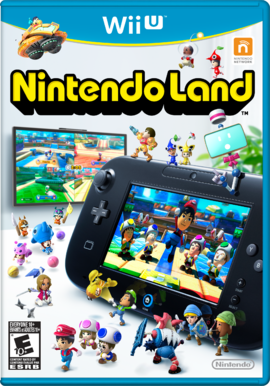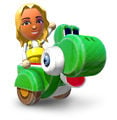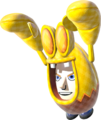Nintendo Land
- Not to be confused with Super Nintendo World.
| Nintendo Land | |||||||||||||
|---|---|---|---|---|---|---|---|---|---|---|---|---|---|
 North American box cover For alternate box art, see the game's gallery. | |||||||||||||
| Developer | Nintendo EAD | ||||||||||||
| Publisher | Nintendo | ||||||||||||
| Platform(s) | Wii U | ||||||||||||
| Release date | Nintendo Selects: | ||||||||||||
| Language(s) | English (United Kingdom) English (United States) French (France) French (Canada) German Spanish (Spain) Spanish (Latin America) Italian Dutch Portuguese (Portugal) Russian Japanese | ||||||||||||
| Genre | Party | ||||||||||||
| Rating(s) |
| ||||||||||||
| Mode(s) | 1–5 players | ||||||||||||
| Format | Wii U: | ||||||||||||
| Input | Wii U:
| ||||||||||||
| Serial code(s) | |||||||||||||
Nintendo Land is a launch title for the Wii U, which was first released in North America on November 18, 2012, Europe and Oceania on November 30, 2012, and Japan on December 8, 2012. The game's setting is based on a virtual theme park, containing twelve minigames (referred to as attractions by Monita, the game's host) built around various Nintendo franchises, including four based on Super Mario and its series. The minigames are played using alongside up to four
![]() (with
(with ![]() if needed), and are intended to showcase the many new features of the Wii U.
if needed), and are intended to showcase the many new features of the Wii U.
In North America, Europe, and Oceania, Nintendo Land comes packed in with the Wii U Deluxe Set. It is also sold as a stand-alone product where players can buy it if they have the Basic Set. It was removed from the Nintendo eShop in North America on November 10, 2013, and was readded to it on August 26, 2016.
Minigames[edit]
The minigames featured in Nintendo Land are divided into three distinct types:
Team attractions[edit]
These minigames involve every player co-operating in some way. However, it is possible to play these minigames with one player only. These are the largest and most expansive attractions in the game. Number of players: 1–5 (1–4 in Battle Quest)
| Image | Name | Description |
|---|---|---|

|
The Legend of Zelda: Battle Quest | Takes place in a The Legend of Zelda-based world, where the Miis are dressed up as Link, sharing Hearts. They must fight many enemies along the way. The player with |

|
Pikmin Adventure | This multi-player minigame is based on Pikmin. The player acts like Captain Olimar, using |

|
Metroid Blast | Based on the Metroid series, the players dress up like Samus Aran in a space area. The |
Competitive attractions[edit]
These minigames involve the one player with the GamePad to pursue or be pursued by other players. Number of players: 2-5
| Image | Name | Description |
|---|---|---|

|
Mario Chase | Based on the Super Mario series, this minigame involves four players dressed as Toads running through a Super Mario-themed park to find a solo player who is dressed as Mario. The solo player can see where the team is on |

|
Luigi's Ghost Mansion | In this minigame, four players are dressed as (in player order) Luigi, Mario, Waluigi, and Wario, respectively. Each player tries to attack the solo player (in a Gold Ghost costume) using flashlights. However, the solo is invisible and can be seen only on |

|
Animal Crossing: Sweet Day | The solo player controls two guards (dressed as Copper and Booker) and must chase the team players who try to collect a certain number of candies scattered throughout the town before time runs out. However, team players get slower each time they collect a candy. Alternatively, six players can play by having two players share a GamePad and controlling the guards using |
Solo attractions[edit]
These minigames can be played only by a single player, but other players can help by using special abilities on the Wii Remote that the player with the GamePad cannot do.
| Image | Name | Description |
|---|---|---|

|
Yoshi's Fruit Cart | This attraction's name and gimmicks are based on the Yoshi franchise. The player must draw lines on |

|
Octopus Dance | This game is based on the Game & Watch game Octopus. The player must memorize the moves of the character on the TV screen and repeat them using either the control sticks or the gyro sensor. Players on |

|
Donkey Kong's Crash Course | This minigame is aesthetically based on the arcade game Donkey Kong. The player must navigate through a series of paths and platforms by tilting |

|
Takamaru's Ninja Castle | This minigame is based on the Family Computer Disk System game The Mysterious Murasame Castle. Here, the player must use the |

|
Captain Falcon's Twister Race | In this F-Zero-themed game, the player must guide a high-speed wind-up vehicle to the goal while holding |

|
Balloon Trip Breeze | The player controls their character through the sky collecting balloons and avoiding obstacles, just like the NES game Balloon Fight. Players on |
Prizes[edit]
- Main article: Prize
The player can use the Nintendo Land Coins[2] obtained in the minigames to play the Coin Game,[3] a retro-styled pachinko minigame located at the Central Tower. For every stage that the player beats, the tower dispenses a prize in the form of a ? Block that lands somewhere in the plaza. Interacting with the block reveals the prize inside which is usually an object found within the various attractions. There are 200 prizes in total.
Reception[edit]
The game has been well-received. GameXplain gave the single-player 4 stars out of 5 and the multi-player 4.5 stars out of 5[4] and referred to it as the best Nintendo multiplayer game since Super Smash Bros. Brawl. GamesMaster gave it 86/100 (86%), describing it as "An essential purchase for party lovers that whets the Nintendo appetite. Bring friends." IGN gave it an 8.7 score out of 10, and GameSpot gave it a score of 8 out of 10.[5]
| Reviews | |||
|---|---|---|---|
| Reviewer, Publication | Score | Comment | |
| Oli Welsh, Eurogamer | 8/10 | "It's not just half a dozen great diversions and a few more besides; it's sweet fan service that celebrates Nintendo's catalogue with more heart and less calculation than we've seen of late. Better yet, it reclaims the used and abused mini-game compilation from the hollow hinterlands of the casual cash-in, lovingly restores it and puts it back where it belongs - amid the hustle, the buzz, the urgent appeal of the arcade. Roll up, roll up!" | |
| Audrey Drake, IGN | 8.7/10 | "Nintendo Land is a brilliant show of what Nintendo’s new console and tablet controller are capable of, and has far more depth and content then you’d expect from a mini-game collection. The attractions are ridiculously fun and offer plenty of variety, whether you’re flying solo or entertaining a group. Throw in high scores to best, gold trophies to earn, stamp achievements to collect and tons of Plaza decorations to unlock, and what you’ve got is an experience that must not be missed, and probably the best show of Wii U available at launch. | |
| Carolyn Petit, GameSpot | 8.5/10 | "Like Nintendo Land's use of familiar properties, this bevy of prizes to collect wouldn't be worth much if it wasn't supported by good gameplay. Thankfully, it is. Nintendo Land isn't just a fine showcase of the Wii U's capabilities, though it certainly is that. It's also a great game in its own right, and particularly if you have friends or family members with whom you can play all of the multiplayer attractions, it's a great way to start getting a lot of enjoyment out of the new console immediately." | |
| Aggregators | |||
| Compiler | Platform / Score | ||
| Metacritic | 77 | ||
| GameRankings | 77.98% | ||
Sales[edit]
Nintendo Land is the 5th best-selling game for the Wii U, selling 5.20 million copies worldwide, as of March 31, 2020.[6] As of March 31, 2022 the game had sold 5.21 million copies worldwide.[7]
Staff[edit]
- Main article: List of Nintendo Land staff
Gallery[edit]
- For this subject's image gallery, see Gallery:Nintendo Land.
A Mii dressed as Luigi
A Mii dressed as a Toad
A Mii riding a Yoshi Cart
A Mii dressed as a Gold Ghost
Media[edit]
- For a complete list of media for this subject, see List of Nintendo Land media.
| File info 0:30 |
| File info 0:30 |
| File info 0:30 |
| File info 0:30 |
| File info 0:02 |
References to other Super Mario games[edit]
- Donkey Kong: Donkey Kong's Crash Course is based on this game. The Opening from the NES version of the game plays while in the menus of Donkey Kong's Crash Course. The music in stages 1 and 3 of Donkey Kong's Crash Course are based on the music for 25m.
- Super Mario Bros.: The Ground Theme plays while in the menus of Mario Chase. The Ground Theme and Stage Clear music are arranged in the credits medley.
- Super Mario Bros. 3: The Chase Arena stage in Mario Chase plays an arrangement of the Athletic Theme.
- Super Mario World: The Mud River Run stage in Mario Chase plays an arrangement of the Athletic Theme.
- Super Mario World 2: Yoshi's Island: The overworld music plays while in the menus of Yoshi's Fruit Cart.
- Super Mario 64: The Slide Hill stage in Mario Chase plays an arrangement of Slider.
- Yoshi's Story: All of the fruit from this game except for the Bomb Berry appear as fruit the player must collect in Yoshi's Fruit Cart. The music for the day and night stages are arrangements of "Yoshi's Song" and "Yoshi's Tale", respectively. These tracks are also arranged in the credits medley.
- Luigi's Mansion: The title and menu music play while in the menus of Luigi's Ghost Mansion. The player playing as the ghost is in a Gold Ghost costume. Variations of the Main Theme play on the Main Floor stage and when a round ends.
- Super Mario Galaxy: The beginning "Overture" plays near the end of the credits medley.
Names in other languages[edit]
| Language | Name | Meaning | Notes |
|---|---|---|---|
| Japanese | ニンテンドーランド[?] Nintendō Rando |
Nintendo Land |
Notes[edit]
- In non-English versions of the game, given that the logos were in English, the subtitles were used to write the game title in their respective language. This was changed in the English versions to be a short phrase relating to the game.
References[edit]
- ^ March 11, 2016. Nintendo Selects : au tour de la Wii U d'entrer dans la danse. jeuxvideo (French). Retrieved November 19, 2024.
- ^ "These are our park's exclusive currency: Nintendo Land Coins." - Monita, Nintendo Land
- ^ "For every stage you complete in this Coin Game, you'll receive a prize." - Monita, Nintendo Land
- ^ [1]
- ^ [2]
- ^ [3]
- ^ Nintendo (May 10, 2022) Top Selling Title Sales Unites. Nintendo Japan. Retrieved May 12, 2022. Archived from the original on May 11, 2022.
External links[edit]
| Nintendo Land | |
|---|---|
| Characters | Ganon • Mii • Octopus • Ridley |
| Mii character costumes | Captain Falcon • Captain Olimar • Gold Ghost • Link • Luigi • Mario • Pikmin • Samus • Toad (Blue • Green • Purple • Yellow) • Waluigi • Wario |
| Objects | ? Block • Automated elevator • Barrel • Bee • Brick Block • Conveyor belt • Gear Crank • Girder • Goal Flag • Goal Gate • Hole • Ladder • Lever • Metallic slide • Moving Rail • Moving Floor • Moving Platform • Mud • Number Flag • Passage • Prize • Roller • Slow Motion Bubble • Spike • Suit of armor • Warp gate • Yoshi Cart |
| Items | Battery • Big battery • Blue check mark • Chili plate • Coin • Flashlight • Fruit (Apple • Bananas • Grapes • Melon • Orange • Peach • Pear • Strawberry • Watermelon) • Heart • Present • Super Light • Star • Yoshi egg |
| Super Mario attractions | Donkey Kong's Crash Course • Luigi's Ghost Mansion • Mario Chase • Yoshi's Fruit Cart |
| Moves | Dash • Jump • Magic • Sidestep • Slide • Tackle |
| Miscellaneous | Fuel • Gallery • Media |




